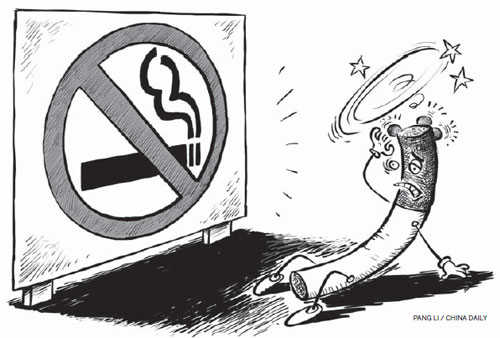Total ban on tobacco ads needed
Updated: 2013-05-31 07:14
By Wang Yiqing (China Daily)
|
||||||||

A World No Tobacco Day 2013 poster shows the devil pulling the strings of a smoking puppet. By asking smokers to reflect whether they are being manipulated by hidden forces (read tobacco companies), the poster forcefully delivers the theme of this year's World No Tobacco Day: Ban Tobacco Advertising, Promotion and Sponsorship.
Ban TAPS is an important part of MPOWER, a policy package developed by the World Health Organization Framework Convention on Tobacco Control. The package includes monitoring tobacco use and prevention policies, protecting people from tobacco smoke, offering help to quit tobacco use, warning about the dangers of tobacco, enforcing bans on advertising, promotion and sponsorship and raising taxes on tobacco.
Tobacco companies try every possible means to increase the sale of their toxic products, and as long as such companies exist their marketing campaigns will continue. Through direct advertising and promotion, and indirect marketing campaigns, donations and sponsorships, tobacco companies want to build their brand image to increase their sales. They also try to pass off smoking as a normal and socially acceptable behavior, and create the illusion that tobacco is a harmless product.
Moreover, tobacco companies' advertisements and campaigns mainly target young people, who are curious, imitative and easily convinced. As a result, many adolescents fall prey to tobacco companies' designs and become tobacco addicts. According to WHO data, exposure to tobacco advertisements increases young people's urge to smoke.
A comprehensive ban on all forms of TAPS, as required by the FCTC, is the only way to protect people, especially the youth, from tobacco companies' marketing tactics. About 80 signatory countries to the FCTC have promised to impose a total ban on all forms of TAPS. Australia was among the first countries to ban all forms of TAPS and the results are there for all to see: only 4.4 percent of the 15-to-17-year-olds in the country were regular smokers in 2012.
As the 77th signatory country, China ratified the FCTC in 2005. Although the convention came into force in China in 2006, the ban on TAPS has not been satisfactory. The Advertising Law bans tobacco ads in only five types of mass media: radio, movies, TV, newspapers and magazines, leaving plenty of room for tobacco companies' to market their products.
The law does not ban outdoor, online and point-of-sale ads of tobacco products. And though the State Administration of Radio, Film and TV issued directives in February 2011 to control the portrayal of smoking in movies and TV serials, placement cigarette ads can still be seen in the mass media.
China's compliance with the TAPS ban has been rather poor. According to the WHO Global Report on the Tobacco Epidemic 2011, China's score for compliance with advertising ban is only 3 on a scale of 10. The Global Adult Tobacco Survey 2010 shows that 19.6 percent of the adults in China reported seeing TAPS in the media (especially in TV commercials) and public places within the past 30 days, while the number of young people (15-24 years) is 27.5 percent.
In December 2012, China issued the National Tobacco Control Plan 2012-15 as part of its commitment to ban TAPS. But some tobacco control professionals say the plan is not comprehensive enough and lacks practical and effective measures to guarantee a complete ban on TAPS.
Tobacco companies will find "smarter" ways of marketing their products to make profits, so a ban on all forms of TAPS is the only way to plug the loopholes in the 2012-15 tobacco control plan. A total ban on TAPS, however, cannot be imposed without an amendment to the Advertisement Law, something that tobacco companies have obstructed for long. Besides, strict punishment has to be imposed on violators to prevent any fiddling with the law.
Strict law enforcement is the key to tobacco control. Without strict enforcement, even a perfect law can become useless. Experiences of other countries show that social organizations' efforts and public campaigns to change society's attitude toward smoking are crucial to tobacco control. Fortunately, most of the Chinese people have realized the harmful effects of smoking and do support the ban on TAPS.
According to China International Tobacco Control Project, 68 percent of smokers and 84 percent of non-smokers disagree or strongly disagree on whether tobacco companies should be allowed to advertise and promote cigarettes as they please. In a country with a long history of tobacco use and influential tobacco companies, the public has to become the main force demanding a complete ban on TAPS in order to prevent our children from smoking and safeguard their health.
The author is a writer with China Daily.
E-mail: wangyiqing@chinadaily.com.cn.
(China Daily USA 05/31/2013 page16)

 Michelle lays roses at site along Berlin Wall
Michelle lays roses at site along Berlin Wall
 Historic space lecture in Tiangong-1 commences
Historic space lecture in Tiangong-1 commences
 'Sopranos' Star James Gandolfini dead at 51
'Sopranos' Star James Gandolfini dead at 51
 UN: Number of refugees hits 18-year high
UN: Number of refugees hits 18-year high
 Slide: Jet exercises from aircraft carrier
Slide: Jet exercises from aircraft carrier
 Talks establish fishery hotline
Talks establish fishery hotline
 Foreign buyers eye Chinese drones
Foreign buyers eye Chinese drones
 UN chief hails China's peacekeepers
UN chief hails China's peacekeepers
Most Viewed
Editor's Picks

|

|

|

|

|

|
Today's Top News
Shenzhou X astronaut gives lecture today
US told to reassess duties on Chinese paper
Chinese seek greater share of satellite market
Russia rejects Obama's nuke cut proposal
US immigration bill sees Senate breakthrough
Brazilian cities revoke fare hikes
Moody's warns on China's local govt debt
Air quality in major cities drops in May
US Weekly

|

|







